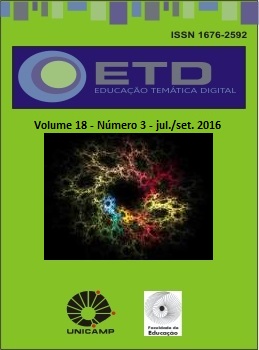Resumo
Some scholars and researchers have been claiming we are in a New Materialist and Posthumanist era. It means that for the ones who are researching in Social Sciences, the focus is not only the human as the centre and the cause of what happens in the social realm. For human, nonhuman and inhuman are attributed the same importance in research once all of them are components of reality, inserted in nature.
Reality is regarded as complex, not simple straightforward isolated cause and effect processes. This is how the classroom is supposed to be observed in educational research: not only teaching and learning, but these two processes and policy making, and identity construction, and emotional flows, and curriculum, and schooling, and…, and…
The purpose of this paper is to reflect upon the complexity of the classroom environment regarded as an assemblage. The hypothesis is that all the components of the assemblage are equally vital, although some components are more vibratory than others. The theory of Vitalism from Driesch (1914) and the Vital Materialism from Bennett (2010a, 2010b) are used as the theoretical tools for analysis. Assemblage Ethnography (YOUDELL, 2015; YOUDELL and MCGIMPSEY, 2015) is the methodology of data collection. A multiple case study was developed in three different schools in United Kingdom: one Primary, one Secondary and one Post-secondary. The results suggest that teacher and students are the components who most influence on the classroom assemblage composition, decomposition and recomposition orienting the flows of matter-energy once they are change-creating agents.
Referências
BENNETT, John. Vibrant matter: a political ecology of things. Durham: Duke University Press, 2010a.
BENNETT, John. A vitalist stopover on the way to a new materialism. In: COOLE, D.; FROST, S. (Eds.). New materialisms: ontology, agency and politics. Duke University Press, 2010b. p. 47-69.
BRAIDOTT, Rosi. The posthuman. Cambridge: Polity Press, 2013.
COHEN, Louis, MANION, Lawrence; MORRISON, Keith. Research ethods in education. 7. ed. London: Routledge, 2011.
COLEMAN, Rebecca; RINGROSE, Jessica. (Eds.). Deleuze and research methodologies. Edinburgh: Edinburgh University Press, 2014.
CONNOLLY, William. The ‘new materialism’ and the fragility of things. Journal of International Studies Millennium, v. 41, n. 03, p. 399-412. 2013. Available in: < http://goo.gl/TExMpz>. Access in: 04 June 2016. ISSN 2071-8330.
COOLE, Diana; FROST, Samantha. (Eds.). New materialisms: ontology, agency and politics. Durham: Duke University Press, 2010.
DE LANDA, Manuel. New philosophy of society: assemblage theory and social complexity. London: Bloomsbury, 2006.
DELEUZE, Gilles; GUATTARI, Félix. Anti-oedipus: capitalism and schizophrenia. London: Bloomsbury, 1984.
DELEUZE, Gilles; GUATTARI, Félix. A thousand plateaus: capitalism and schizophrenia. London: Bloomsbury, 1987.
DEPARTMENT FOR EDUCATION. The national curriculum in England: key stages 3 and 4 framework document. London: Department for Education, 2014. 105 p. Available in: <https://goo.gl/W0TfkB>. Access in: 04 June 2016.
DEPARTMENT FOR EDUCATION. Teachers’ standards: guidance for school leaders, school staff and governing bodies. London: Department for Education, 2013. 15 p. Available in: <https://goo.gl/0MFXHI>. Access in: 04 June 2016.
DOLPHIJN, Rick; TUIN, Iris Van Deer. (Eds.). New materialism: interviews & cartographies. London: Open Humanities Press, 2012. 200 p. Available in: < http://goo.gl/wHTaah>. Access in: 04 June 2016.
DRIESCH, Hans. The history and theory of vitalism. London: Macmillan, 2014. Available in: < https://goo.gl/GoIvOi>. Access in: 04 June 2016.
MAZZEI, Lisa A. (2013) Materialist mappings of knowing in being: researchers constituted in the production of knowledge. Gender and Education, v. 25, n. 06, p. 776-785. Oct. 2013. Available in:
<https://goo.gl/dF4puM>. Access in: 04 June 2016. ISSN 1360-0516.
SEMETSKY, Inna; MASNY, Diana. (Eds.) (2013) Deleuze and education. Edinburgh: Edinburgh University Press, 2013.
TESAR, Marek; ARNDT, Sonja. Vibrancy of childhood things: power, philosophy, and political ecology of matter. Cultural Studies – Critical Methodologies, v. 16, n. 02, p. 193-200. 2016. Available in: <http://goo.gl/wfCuVL>. Access in: 04 June 2016. ISSN 1552-356X.
YOUDELL, Deborah. Assemblage theory and education policy sociology. In: GULSON, K., CLARKE, M.; PETERSEN, E. (Eds.). Education policy and contemporary theory: implications for research. London: Routledge, 2015.
YOUDELL, Deborah; McGIMPSEY, Ian. Assembling, disassembling and reassembling youth services in austerity Britain. Critical Studies in Education, v. 56, n. 01, p. 116-130. 2015. Available in:
<https://goo.gl/y1I2qO>. Access in: 04 June 2016.
A ETD - Educação Temática Digital utiliza a licença do Creative Commons (CC), preservando assim, a integridade dos artigos em ambiente de acesso aberto.


